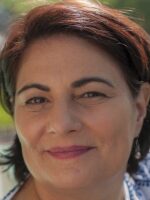MARY LOUISE KELLY, HOST:
This Sunday, Nicaragua holds a presidential election, although for many, calling this event an election is a stretch. Longtime President Daniel Ortega is seeking a fourth term. In the run-up to the vote, he has jailed nearly every opposition candidate and political critic. And he's passed a series of laws that criminalize dissent. Tens of thousands of Nicaraguans have fled the country, mostly to neighboring Costa Rica, which is also where we find NPR's Carrie Kahn.
Hey, Carrie.
CARRIE KAHN, BYLINE: Hi.
KELLY: Hey. So where are you in Costa Rica and not Nicaragua to cover this election?
KAHN: Yeah. I tried to get there this morning on an early morning flight, but I was barred from boarding the plane. Avianca, the airline I booked the flight was said I was denied admission by the Nicaraguan government. No more information given. And that's really been the practice for every foreign journalist that has said they were journalists and tried to get in. And this is all part of the government's crackdown on dissent and any independent journalism there.
Mary Louise, it's so unprecedented. You know, I can get into Cuba and report from there. It's difficult, but I can get in and have always been able to get into Nicaragua. I covered the last presidential election in 2016, when Ortega won. And this is just very severe. And this has stepped up crackdown on the press in Nicaragua.
KELLY: Interesting. Well, it raises questions, I guess, again about Ortega and what his strategy is here. We should remind people, he rose to prominence back in the '70s and '80s as this young revolutionary. He was going to overthrow the U.S.-backed dictatorship in Nicaragua. His opponents now say history is repeating itself, except now Ortega is the dictator. What do you think? Is that fair?
KAHN: Well, he did jail seven potential presidential candidates, and there are more than 150 other political opponents in jail. It's - clearly he shut out fairness or democracy in the electoral process. And it's not difficult to draw comparisons to his own fight against the U.S.-backed dictator Somoza in the '70s. He was jailed back then for fighting against him and speaking out against him. The situation here has been deteriorating for years, but really took an abrupt and brutal turn this spring. And Ortega and his wife - she's the vice president - have been widely condemned internationally for the slide into authoritarian rule. Some of the opposition leaders he's jailed include many of his past allies and even former guerilla comrades that he fought the revolution with. These opponents are in their 70s, their late 70s, and he's put them in jail recently.
KELLY: Well, and how does he explain all this, jailing opponents, keeping journalists like you out of the country?
KAHN: He insists that all forms of opposition are due to terrorists, coup instigators that are funded by the U.S. Ortega, he's nearly 76 years old, and he's said to be in poor health and really isn't seen in public much. But here's an interview he did recently on state-controlled TV.
(SOUNDBITE OF ARCHIVED RECORDING)
PRESIDENT DANIEL ORTEGA: (Non-English language spoken).
KAHN: He says he needs to stay in office indefinitely to protect the country from these enemies. This is his narrative that he and his wife - and she's this eccentric new age poet who pretty much runs the country's data activities - and they both espouse this line to justify their crackdown and the police state that they really have created here.
KELLY: What is the U.S. position on this or Nicaragua's neighbors in Central America? What are they saying about what, by all appearances, is a new dictatorship in the region?
KAHN: Well, the U.S. is seeing a spike in migration from Nicaragua, and that is very new. Nicaraguans were not coming to the U.S. in large numbers, not like their, you know, Hondurans are Guatemalans, their Central American neighbors. And the U.S. has sanctioned government officials, including Ortega's wife and some of their children. I spoke to a senior U.S. administration official who would only speak to me if I didn't identify him. And he said that after Sunday's election, the U.S. will look for even more targeted and substantial sanctions, including reevaluating special trade perks that Nicaragua has. But there isn't a united front against Nicaragua in the hemisphere. It's going to be difficult. Countries like Mexico and Argentina, for example, have abstained from votes containing or condemning or Ortega's power grab. So we'll have to see what happens after the election.
KELLY: That is NPR's Carrie Kahn trying to report from Nicaragua, reporting for the moment from San Jose, Costa Rica.
Thank you, Carrie.
KAHN: Thanks so much. Transcript provided by NPR, Copyright NPR.






